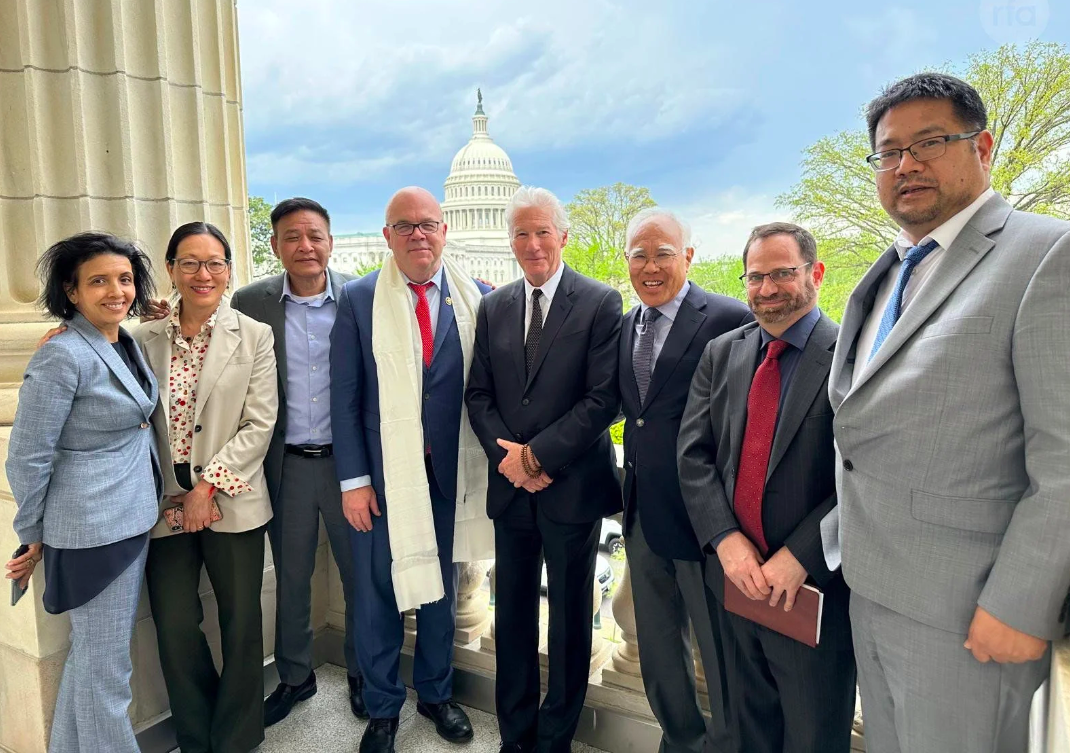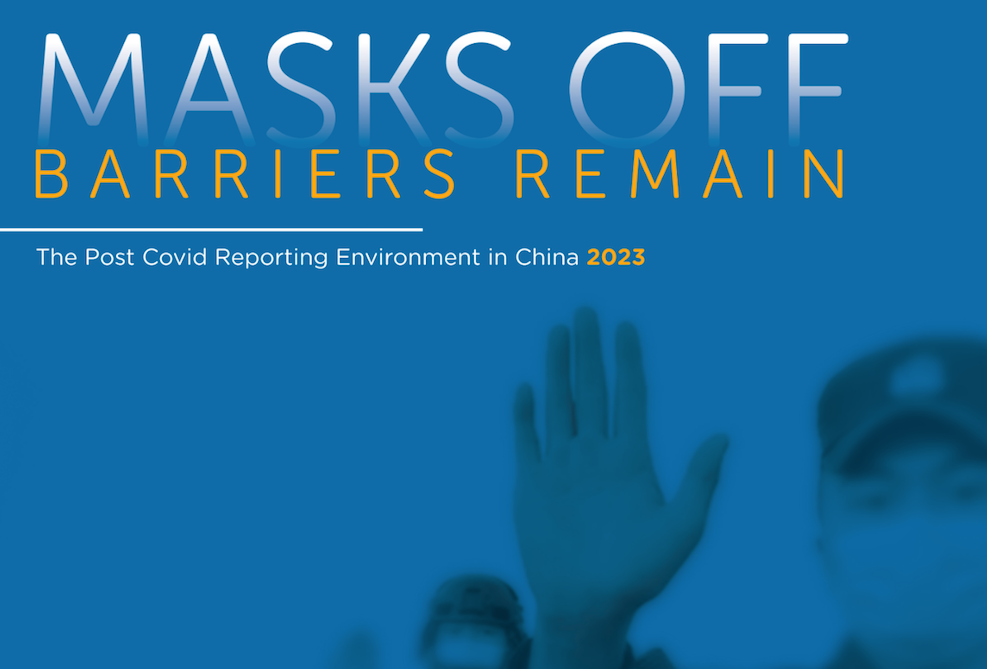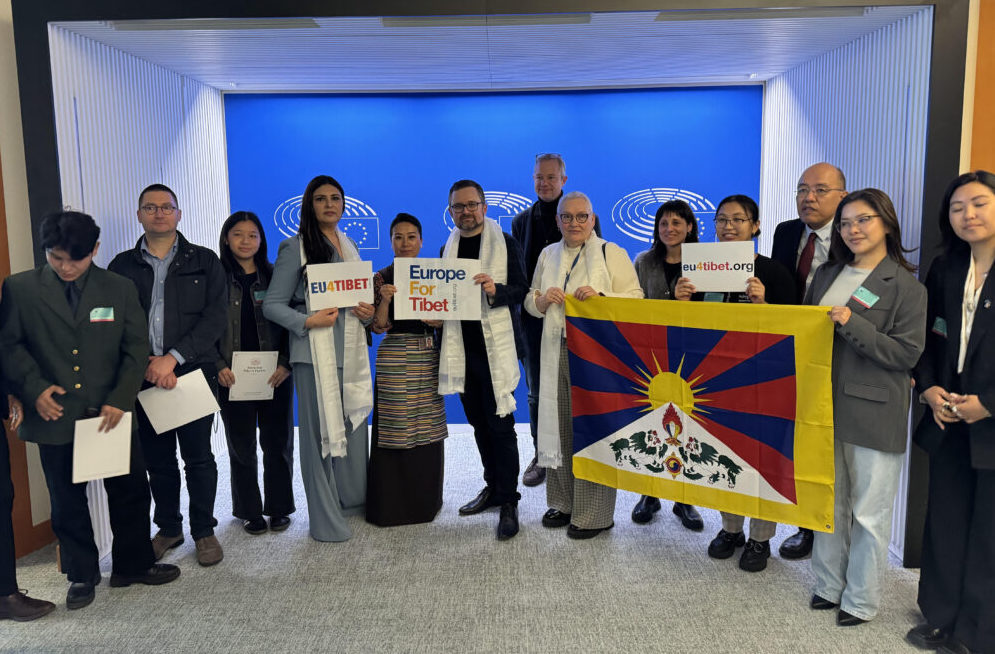Relations with Tibet took a healthy step forward recently with the Jan. 20 launch of the Taiwan-Tibet Exchange Foundation, a nongovernmental agency charged with handling relations with the Tibetan government-in-exile. This role had been within the purview of the Mongolian and Tibetan Affairs Commission–a Cabinet-level body that will likely be phased out of existence as relations with Tibet gradually normalize.
Although ceremonies marking the launch of nongovernmental organizations are not usually presided over by heads of state, the presence of President Chen Shui-bian at this one was an indication of its importance as a signifier of the government’s change in Tibet policy. Chen made it clear that Taiwan no longer considers Tibetans to be Chinese citizens.
“When we stop considering Mongolians and exiled Tibetans to be mainlanders, many of the problems we had in the past can finally be resolved,” Chen said at the event.
For decades, relations between Tibet and the ROC have been the victim of the intricate circumstances defining the complex relationship that exists across the Taiwan Strait. Despite political cross-strait rivalries, both the Communist Chinese regime and the Kuomintang that ruled Taiwan for half a century agreed that both Mongolia and Tibet belonged to China. They differed only in which China held sovereignty.
Tibet’s government-in-exile strongly opposed those claims. According to the ROC publication Sinorama, “In 1959 the Chinese communists invaded Tibet, and the Dalai Lama and leading officials fled abroad.” The Constitution claims the ROC is the legitimate government of all China, including Tibet. This was read by many people in the international community as tacit approval of China’s actions.
The commission, a legacy of the KMT government, has long been an obstacle to close relations. Members of the Tibetan government-in-exile mistrusted the Cabinet-level agency set up to administer ROC sovereignty over Tibet. They refused to deal with the body, leaving no channel open for talks. The commission itself stood as an impediment to closer ties, creating obstacles in the run-up to the Dalai Lama’s Taiwan visits in 1997 and 2001.
Pundits have pointed out that the logic of the ROC’s claim of sovereignty over Tibet stood in direct contrast to Taiwan’s own efforts to gain international recognition in defiance of China’s diplomatic blockade. Said one local editorial, “If there is one thing that Taiwan must be a steadfast champion of on the international stage, one policy with which it must become clearly identified, it is the right of a people to self-determination.” The situation was somewhat relaxed with attempts by former President Lee Teng-hui to mend relations with the Dalai Lama. In 1997, the Tibetan spiritual leader made his first visit to Taiwan and was received by Lee, who also attended the ribbon-cutting ceremony for the Tibet Religious Foundation of the Dalai Lama–a representative office opened by the exiled Tibetan government. It opened its doors in 1997 to boost bilateral ties with Taiwan, which is home to many adherents of Tibetan Buddhism.
To further strengthen ties with the Tibetan government-in-exile, the Democratic Progressive Party began considering second-track diplomacy. The Chen administration began seeking a mechanism to increase mutual understanding and cooperation. In 2000, Chen invited the Dalai Lama to make a second visit to Taiwan and promised to provide aid to Tibetans. In September 2002, Taiwan-Tibetan bilateral talks finally resumed.
“The Taiwan Tibet Exchange Foundation is a non-official body. It will not substitute the functions of the Mongolian and Tibetan Affairs Commission,” emphasized Day Sheng-tong, chairman of the foundation. According to Day, the group will initially handle functions that are not within the commission’s mandate, such as managing religious, cultural and tourism exchanges, mediating disputes and handling visits by people from either side.
Although officially it is an unofficial channel of communication, the foundation is made up of members of government think tanks, ruling-party politicians and entrepreneurs familiar with Tibetan affairs. Day, whose resume includes such prestigious appointments as chairman of the National Association of Small and Medium-Size Enterprises and presidential adviser, will serve as the foundation’s first chairman while DPP Legislator Hsiao Bi-khim, who has enjoyed an intimate connection with Tibetan affairs, will serve as vice chairperson. Presidential Office Deputy Secretary-General Joseph Wu is the new foundation’s secretary-general.
The foundation’s US$580,000 startup capital will come from both government and private sources. US$87,000 has been diverted from the Mongolian and Tibetan Affairs Commission’s budget, US$145,000 from the Mainland Affairs Council and US$348,000 is derived from private contributions.
Among the foundation’s stated missions, medical care is slated as one of its most urgent tasks. In an interview with local media outlets, Wu said the group is hoping to send a delegation to inspect the health-care situation in Dharmsala, India–home of the Dalai Lama and the Tibetan government-in-exile–and might ask local Taiwanese medical groups to provide assistance. Agricultural support to exiled Tibetan communities was also identified as an important goal, according to the foundation’s deputy secretary-general Weng Shih-chieh. He added that the possibility of hiring exiled Tibetans as foreign laborers in Taiwan is also being examined.
Wu said the foundation would also take the initiative to push for academic exchanges. “We will arrange for some Tibetan students to pursue higher education in Taiwan and will arrange for seminars about Tibetan issues to be held in Taiwan and India,” said Wu.
The non-official nature of the foundation is expected to help it succeed where the inflexible commission failed. The agency was unable to establish a mechanism for Taipei to interact efficiently with Dharmsala. The foundation will take over several duties, such as helping Tibetans come to Taiwan for education and job training, that the commission abandoned in 2000.
The foundation will also serve an important role in reconvening talks with the Dalai Lama and Tibet’s exiled government in the hopes of establishing a stable channel of communication and building a long-term relationship. The Mongolian and Tibetan Affairs Commission’s tasks will be reduced to handling the affairs of Tibetans currently living in the Hsitsang Autonomous Region–China’s name for Tibet.
According to commission officials, the Cabinet-level body was instrumental in laying the groundwork for the foundation and one of its members has a seat on the new group’s board of directors. They expressed optimism at the establishment of the non-official body and its prospects for establishing a conduit for Taiwan-Tibet exchanges.
Though the new foundation will focus on stimulating private exchanges, Day said it might be authorized in the future to act more directly as the government’s agent with regards to Tibetan affairs. That’s why government officials like Wu were asked to facilitate coordination with government departments.
The opening of the foundation symbolizes the government’s abandonment of its recognition that the exiled government of Tibet is part of China. Instead, it regards the exiled government of Tibet as a political entity independent from the Beijing regime. The president noted that the people and government have reached a consensus on strengthening ties with Tibet–one of Taiwan’s friends in the international community.
Sources claim that the Dalai Lama is likewise positive about this new move. In a letter read at the foundation’s ribbon-cutting, His Holiness wrote that, “The creation of this foundation shall promote pragmatic cultural exchanges between Taiwanese and Tibetans, but shall also assist exiled Tibetans living in India and Nepal in terms of health, education and agriculture.” Political observers have pointed out that, as Taiwan moved into the 21st century, the Tibet issue should have been separated from the rivalries with China. The people of Taiwan should be made aware of the complexity of Tibetan relations and given more religious, human-rights and cultural information about Tibet.









